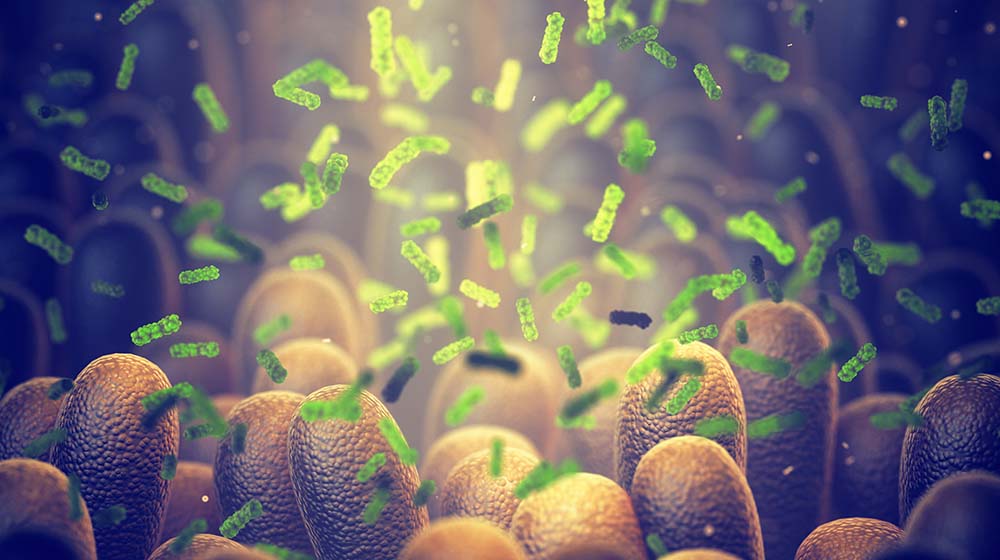
Hormone Health TRT


Ever wonder why some people seem to shed pounds so easily while others struggle despite their best efforts? The answer might not be in your workout routine or calorie count—it could be in your gut. Your gut microbiome, made up of all the tiny organisms living in your intestines, plays a surprising role in how your body processes food, regulates hunger, and even stores fat.
Today, we explore the complex link between gut flora and weight loss. Discover how your gut bacteria can influence digestion and trigger inflammation, and learn simple strategies to restore balance. Here is why a happy gut could be the missing piece in your weight loss journey:
“Flora” is another term for microorganisms collectively.
Your gastrointestinal (GI) system is home to trillions of tiny organisms. Gut bacteria—along with fungi, viruses and other microbes—form a unique community in your digestive system known as the gut microbiome. These microbes don’t just camp inside of your bowels—they actively contribute to better digestion, produce beneficial molecules, and even collaborate with your immune cells.1,2
But why should you care about what microorganisms do? Believe it or not, the balance of your gut bacteria can affect your weight and energy levels. A well-balanced gut microbiome is the key to regulating hunger hormones, reducing inflammation, and aiding your body's food assimilation.3
The gut microbiome is a collection of microorganisms, primarily bacteria, that live in your digestive system. Much like your fingerprint, your microbiome is unique. It is influenced by factors such as diet, lifestyle, and genetics.
Researchers have found the microbiomes of obese people and people with normal weight to be different. The composition of gut bacteria can also be altered in other conditions, for example, irritable bowel syndrome (IBS) and type 2 diabetes.3
Both beneficial and harmful bacteria live in your gut. The “good” bacteria—such as Bifidobacteria and Lactobacillus—support digestion and reduce inflammation. The “bad” bacteria, when present in excessive amounts, can lead to issues like poor digestion or weakened immunity.
Maintaining a healthy gut is all about balance: supporting the growth of beneficial bacteria and keeping the harmful ones in check. When the balance between your little companions tips—often due to stress, poor diet, or illness—weight loss might feel like an uphill battle. 1,3
Gut bacteria and human health are closely connected. These tiny organisms play a big role in how your body manages inflammation, hunger, and digestion. Let’s take a closer look at how microbiota may impact your health and weight.
An imbalance in gut bacteria can lead to chronic inflammation. When harmful bacteria outnumber beneficial ones, they produce molecules that can damage the gut lining and trigger an immune response.4 This state of inflammation not only contributes to conditions like obesity and insulin resistance, but can also hinder your weight loss journey.
Gut bacteria play a role in regulating hormones that control hunger and satiety, such as ghrelin and leptin. Certain beneficial bacteria can enhance the production of molecules that signal to your brain that you’re full. Maintaining a balanced gut can help you feel satisfied after meals and reduce the likelihood of overeating.2
Your gut bacteria help break down the food you eat, especially fiber, which the body can’t digest on its own. These bacteria convert fiber into small-chain fatty acids, which provide energy, support fat metabolism, and reduce fat storage. When your gut microbiome is diverse and thriving, your body can process nutrients more effectively.2
As you may already understand, gut health can play a significant role in weight loss. The connection between gut bacteria and weight loss is rooted in the way your gut flora affects metabolism, hunger regulation, and fat storage.2,4
A healthy gut microbiome may reduce your levels of inflammation, help you extract energy from the food you eat, and optimize nutrient absorption. On the other hand, an imbalanced microbiome can make weight loss more challenging by causing cravings, slowing metabolism, and hindering the processing of certain foods.4
The good news is that you can restore your gut health and support weight loss by making simple lifestyle changes. Introducing certain foods into your diet—while eliminating others—could be enough to nourish your gut flora and improve your overall health.
Improving your gut health is a great way to support your weight loss journey. But how can you restore gut health to lose weight? Here are some gut-friendly food options to include in your diet:
Probiotics are live bacteria that work by boosting the number of beneficial microbes in your gut. Foods like yogurt, kefir, sauerkraut, and kimchi are excellent sources of probiotics.4
The bacteria in your gut feed on fiber. Whole foods such as legumes, fruits, and vegetables can make excellent food for gut flora. Moreover, a fiber-rich diet helps regulate appetite and promote the feeling of fullness.5
Fermented foods, such as miso, tempeh, and pickles, are packed with natural probiotics that help diversify your gut microbiome. These foods also support the gut lining, which helps prevent harmful bacteria from causing inflammation.6
Polyphenols are plant compounds that act as antioxidants and reduce inflammation. Foods like green tea, berries, dark chocolate, and olive oil are great sources of polyphenols.7
Incorporating healthy fats from sources like avocados, nuts, seeds, and fatty fish can support gut health. Omega-3 fatty acids, in particular, have been shown to encourage the growth of beneficial bacteria and also reduce the presence of harmful ones.8
Weight loss is a complex process influenced by many factors, including lifestyle habits, hormonal balance, and overall health. To achieve sustainable results, it's important to address all aspects of your well-being.
Sleep quality is often overlooked when it comes to weight loss. However, sleep plays an important role in regulating hunger hormones like ghrelin and leptin. Poor sleep can increase cravings for high-calorie foods and make it harder to lose weight. To make your weight loss journey easier, aim for 7-9 hours of restful sleep each night.9
Regular physical activity may not only boost your metabolism, but also improve your gut health and promote the growth of good bacteria.10 Of course, it works best when combined with a proper nutrition plan. 11 We recommend adopting a well-balanced routine that incorporates a mix of cardio, strength training, and flexibility exercises.
Hormones such as insulin, cortisol, and thyroid hormones dictate how your body stores and burns fat. Chronic stress, for example, can increase cortisol levels and lead to weight gain. To counter the effects of stress hormones, engage in mindfulness practices such as yoga or deep breathing.12
While gut health is important, you shouldn’t forget about your caloric intake. Your diet should include enough protein, healthy fats, and complex carbohydrates. Balance is crucial, so focus on whole, nutrient-dense foods, and avoid overly restrictive diets.
How many times have you tried to lose weight? Your mindset and emotions can significantly influence your ability to get in shape. Many people resort to emotional eating when dealing with stress.13 So, take time to reflect on your mental health. Prioritize self-care, therapy, and relationships that offer much-needed support on your weight loss journey.
Gut health is a vital piece of the weight loss puzzle, but it’s just one part of a larger picture. If your goal is to achieve lasting results, approach your weight and overall health from multiple angles. The key is never as simple as focusing on one problem alone.
Weight loss is best achieved through a combination of nutrition, exercise, quality sleep, and stress management. This is where Opt Health physicians can help. By evaluating your unique health needs, we create personalized plans for health optimization that consider your lifestyle, goals, and overall well-being.
Thank you for reading. Until next time, be well and live long.
1. Microbiome. National Institute of Environmental Health Sciences. Accessed January 14, 2025. https://www.niehs.nih.gov/health/topics/science/microbiome
2. Davis CD. The Gut Microbiome and Its Role in Obesity. Nutr Today. 2016;51(4):167-174. doi:10.1097/NT.0000000000000167
3. Afzaal M, Saeed F, Shah YA, et al. Human gut microbiota in health and disease: Unveiling the relationship. Front Microbiol. 2022;13. doi:10.3389/fmicb.2022.999001
4. Noor J, Chaudhry A, Batool S, Noor R, Fatima G. Exploring the Impact of the Gut Microbiome on Obesity and Weight Loss: A Review Article. Cureus. 2023;15(6):e40948. doi:10.7759/cureus.40948
5. Fielding RA, Lustgarten MS. Impact of a Whole-Food, High-Soluble Fiber Diet on the Gut-Muscle Axis in Aged Mice. Nutrients. 2024;16(9):1323. doi:10.3390/nu16091323
6. Jalili M, Nazari M, Magkos F. Fermented Foods in the Management of Obesity: Mechanisms of Action and Future Challenges. Int J Mol Sci. 2023;24(3):2665. doi:10.3390/ijms24032665
7. Wang X, Qi Y, Zheng H. Dietary Polyphenol, Gut Microbiota, and Health Benefits. Antioxidants (Basel). 2022;11(6):1212. doi:10.3390/antiox11061212
8. Menni C, Zierer J, Pallister T, et al. Omega-3 fatty acids correlate with gut microbiome diversity and production of N-carbamylglutamate in middle aged and elderly women. Sci Rep. 2017;7(1):11079. doi:10.1038/s41598-017-10382-2
9. Papatriantafyllou E, Efthymiou D, Zoumbaneas E, Popescu CA, Vassilopoulou E. Sleep Deprivation: Effects on Weight Loss and Weight Loss Maintenance. Nutrients. 2022;14(8):1549. doi:10.3390/nu14081549
10. Clauss M, Gérard P, Mosca A, Leclerc M. Interplay Between Exercise and Gut Microbiome in the Context of Human Health and Performance. Front Nutr. 2021;8. doi:10.3389/fnut.2021.637010
11. Dalton A, Mermier C, Zuhl M. Exercise influence on the microbiome-gut-brain axis. Gut Microbes. 2019;10(5):555-568. doi:10.1080/19490976.2018.1562268
12. Ylli D, Sidhu S, Parikh T, Burman KD. Endocrine Changes in Obesity. In: Feingold KR, Anawalt B, Blackman MR, et al., eds. Endotext. MDText.com, Inc.; 2000. Accessed January 14, 2025. http://www.ncbi.nlm.nih.gov/books/NBK279053/
13. Xenaki N, Bacopoulou F, Kokkinos A, Nicolaides NC, Chrousos GP, Darviri C. Impact of a stress management program on weight loss, mental health and lifestyle in adults with obesity: a randomized controlled trial. J Mol Biochem. 2018;7(2):78-84.
Your health, your terms. Discover how personalized care can transform not just the way you feel, but how you live.